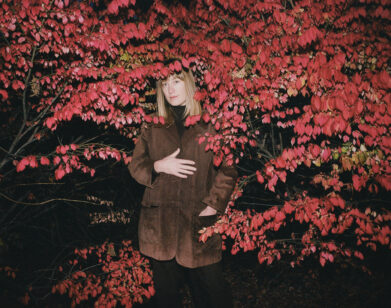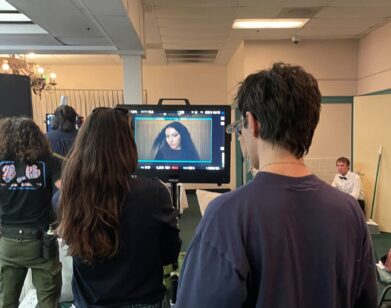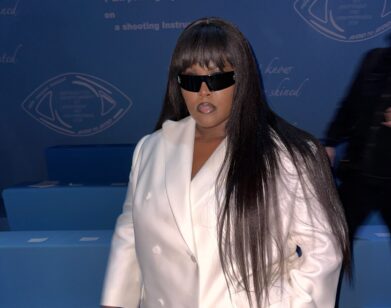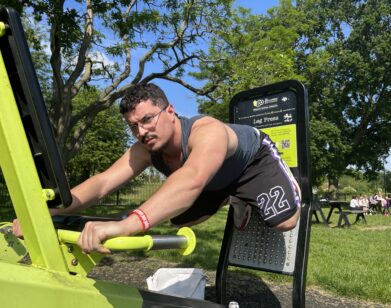Protomartyr May Have Predicted 2020
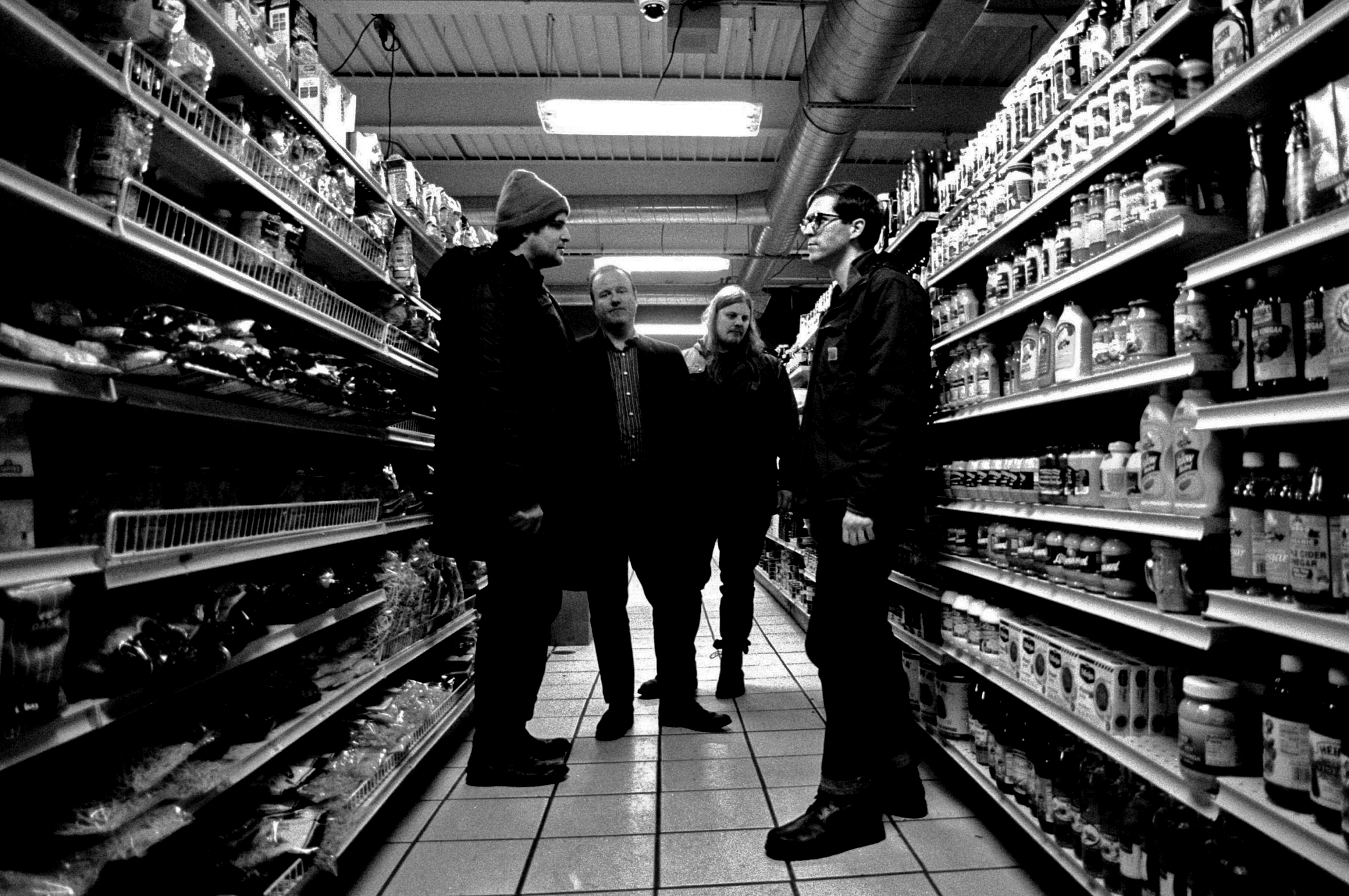
Photos by Trevor Naud.
Detroit’s Protomartyr have been making dense, soulful, gut-punching guitar music for over a decade now. Their fifth album, Ultimate Success Today (Domino), is launched this month into our convulsing, virus-riddled world with typical dark humor and mirth. The first single, the end-of-days “Processed By The Boys,” soundtracked the first few weeks of the national lockdown when it was released in March—a taut, melancholic slab of impotent rage with lyrics that couldn’t have foretold the unfolding events of 2020 with clearer foresight: “When the ending comes, is it gonna run/At us like a wild-eyed animal?/A foreign disease washed upon the beach /A dagger plunged from out of the shadows.”
Their music prowls like a 6am hangover punching you awake. It comes for you—snapping, angry, forlorn, stupefied, hurt, afraid. It’s impossible to disassociate the meaning in their music from the man who fronts the band. Joe Casey stalks the music his band makes. When his mouth opens, he inhabits every inch of the song the way Mark E. Smith once did, finding a similar piece of ground: dissonant and blunted, absolutely conscious of his limitations but shouting even louder because of them. Yet unlike Smith, Casey’s voice is one simultaneously filled with soul, beauty, and pathos, aware of everything and twitchy with it. For sure, it’s not for everyone, but those who get dragged under find themselves never wanting to be let go.
———
RICHARD TURLEY: What was the process of putting the album together like?
JOE CASEY: After the Consolation EP, we were looking to change the sound a little bit. Greg usually has an idea of how it can sound different, or to make it exciting for him and the band. Greg’s big idea for this one was bringing jazz musicians in, which is always frightening because, you know, Greg’s a grown-ass man, but if your guitar player goes, “I’ve been listening to lot of jazz,” you’re like … this is not going to be good. But he’s pulled it off before, so I don’t know why I ever doubt him. It really proves that as we get confident enough with our sound, we’re able to bring in people who are pretty much strangers to collaborate with. With “Processed By The Boys,” the clarinet line in that completely changes the song. He comes in and adds that clarinet line, and it’s like, “Okay, now this is something new and exciting.”
TURLEY: You recorded the album in upstate New York, right? Was that the first time you’ve recorded there?
CASEY: First time. With studios, you don’t really see them ahead of time. In the past, we liked the idea of getting out of Detroit, going some place kind of isolating to record. And for this one, we just wanted to make sure that we were close enough to New York so collaborators could get to the studio and it wouldn’t be a slog.
I was excited because a friend of ours, Corey from the band Spray Paint, who ends up singing some backing vocals on the album, opened a bar in Kingston, New York. And I was like, “Oh, it’s going to be great, we can record then we can hang out at this bar and have a good time, and our friend can buy us free drinks.” I didn’t see his bar at all because we were in the studio the whole time. And that’s kind of the duality of it—you can be in the nicest place on earth and you’re just not going to be able to enjoy it because you’re here in the studio the whole time.
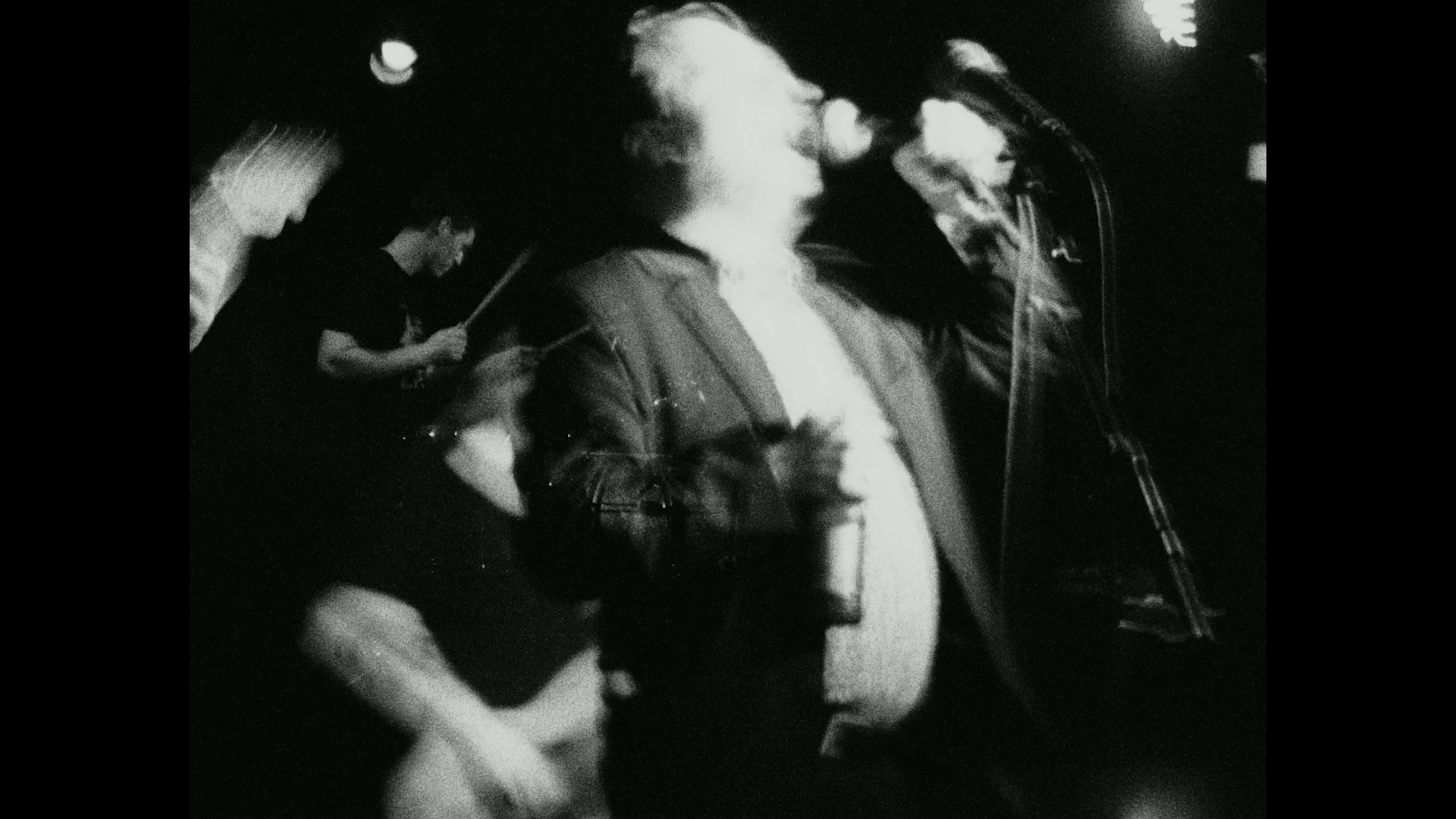
TURLEY: How do you personally deal with being in the studio?
CASEY: A studio can be so tedious. Before we go to the studio we’re practicing, so I’ve been singing some lyrics. But I’ve learned not to have all the lyrics flushed out. So there’s some songs that I have a general idea of what they’re supposed to sound like – I have like gibberish and because I know I’m going to be in the studio for hours as they’re working on the song, then I can use that time to like come up with lyric ideas, because I wanted to kind of get back to an earlier form of responding to how the songs make me feel emotionally, as opposed to overly thinking about them.
In the past, I’ve hated when sometimes I’ve done lyrics too early and then they add a bunch of other instrumentation that changed the song musically. And I get pissed off because I wouldn’t have sung the song that way if I knew that all this stuff was going to be added on top of it. So I kind of wait now until pretty much all this stuff has been added on top of it. So it usually happens near the end of the recording process. So that means a lot of sitting around and not doing much.
TURLEY: What’s your favorite track on the new album?
CASEY: It shifts around. People always say like, “Oh, I love them all.” Like, no; there’s always ones that you favor. Just like children. “Bridge and Crown” right now is my favorite. To me, it’s the true climax of the album. It’s where the lyrical themes I’ve been talking about for five albums kind of reaches its moment and boils down to a couple lines. So right now that one’s my favorite. And maybe I’m saying this because that one was one where they brought the band the music and play it, and immediately I had the lyrics in my head, I immediately knew how I was going to sing it. It’s one of those songs that feels like it writes itself. It’s painless in its creation.
TURLEY: Who do you write your songs for? For you? Or do you have specific people in mind?
CASEY: When we first started, I was writing for myself, because you expect no one’s going to hear your music. And I try to keep that, but I think as you realize that people do listen to what you do, you write for yourself as if you were a different person. You think of yourself in the third person, an imaginary audience that has your taste. So you’re always trying to impress yourself and them, we hope. I learned not to be completely isolated with my thoughts and just want to please myself because you might think you’re doing that, but actually you are reaching out for some sort of audience surrogate, even if it is yourself.
TURLEY: When you’re in front of an actual audience, on stage, you’re like this prowling, restless figure, never looking fully comfortable. I assume that comes from a genuine awkwardness about being up there?
CASEY: It comes from a general sense of stage fright. I wanted the performance to come out of my awkwardness, because the music calls for that. What’s great about the band is that none of us were born to be on stage. So I’m trying to build something out of being frightened and scared, and the music is frightened and scared and the things that we sing about are frightened and scared. So it’s all kind of tied together.
TURLEY: What was your route to being in the band?
CASEY: I grew up next to a Benedictine Monastery in Detroit. The one thing me and Aretha Franklin have in common is we started singing in the church in Detroit. The Catholic church I went to is a very big church—very empty, so you can sing badly and no one can hear you. That’s the first place I sang. I learned how to sing, probably, from singing these bad Catholic hymns.
I worked at the Monastery as an altar boy, in the office with the monks. I thought that was a pretty good job. Then, I really didn’t do much in college, and kind of drifted through it and didn’t take advantage of it. Got spit out at the end. So I ended up trying to put up cell phone towers for like a year; I was very bad at that. I had to try to convince people to give me land to put a cell phone tower on, back when there were no cell phone towers. “Hey, can I buy your backyard to put a giant cell phone on it?” “Does it cause cancer?” “No one knows.” I was a terrible salesman. I couldn’t lie.
And then after that, I really did nothing for many years until my cousin got me working at a comedy club as a doorman. Working as a doorman at a comedy club is not a career, even though I was making it a career, because I’m stubborn. So I worked at one comedy club until it closed. Then I got a job at another friend’s comedy club. I was kind of drifting through life, and I finally decided that it would be fun to be in a band.
TURLEY: Why are you doing this? The music, the band, this lifestyle.
CASEY: Before the band, I didn’t do anything. Being in quarantine reminded me of me before the band, where I’m not doing shit. Sitting, watching TV, eating food, going to sleep, getting drunk. Recycled over and over again. Really, the band was a way to break out of that kind of cycle of doing fuck all.
I’m a stubborn person in that I will continue to do something until it’s completely broken. I was a Boy Scout, and most would leave the Boy Scouts. My Boy Scout troop had to disband. I don’t quit things; things quit me. I stayed in Little League baseball long after you’re supposed to. I stayed until I was the best baseball player, but I was like three years older than everybody else in the Little League. I don’t quit anything. I stick with things.

